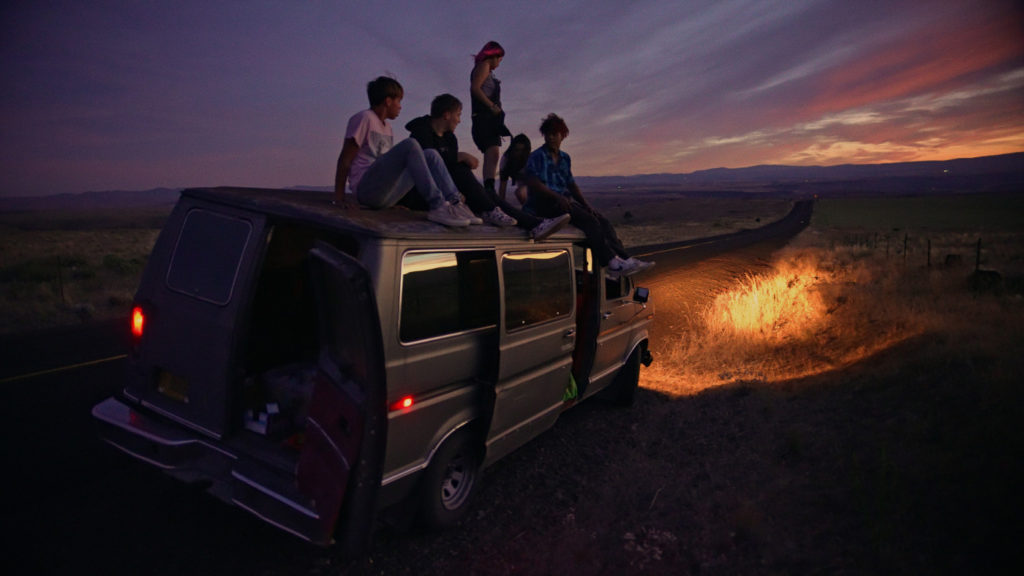KVIFF Review: Gasoline Rainbow (2023)

With their body of work, Bill Ross IV and Turner Ross usually experimented with the docu-fiction label, trying to redefine it always in a new and exciting way. Maybe the best example of it is their 2020 near-masterpiece Bloody Nose, Empty Pockets. The premise of it was simple: it is the last day and night of a Las Vegas bar that is about to close, the execution was along the lines of the observational approach to documentary filmmaking in which we get introduced to the staff and the patrons, their anxieties, traumas and grievances, but there was also a catch. The bar itself was not located in Las Vegas, but in the Ross brothers’ adoptive hometown of New Orleans, it was not about to close (but was closed for some time for the purposes of filmmaking), and “the regulars” were selected conveniently from other bars they frequented.
The Ross brothers’ newest film Gasoline Rainbow is billed as their first fiction feature, but their vision and mission with it is no less documentary than with their previous films. It premiered at last year’s edition of Venice, touring the festivals since and even becoming available on the Mubi platform this May. We got to see it at Karlovy Vary, in the non-competitive Horizons section.
The premise is quite simple here as well. Five friends from a small town in East Oregon, about to graduate from high school, embark on a 500+ miles long road trip to the coastline as their farewell adventure before they have to step into adulthood. They come with their own histories, backgrounds and anxieties (one is the child of alcoholic parents, one is the child of undocumented immigrants, some of them are of mixed race origins, feel the racial prejudice and fear segregation and so on). Along the way, they will drink, party, do recreational drugs, lose their van, hop the cargo train, be invited to a boat ride and, most importantly, meet interesting people who could help them figure out life that is ahead of them.
It is partly a contemporary take on Jack Kerouac’s book On the Road, and partly a coming-of-age summer adventure movie not too dissimilar from Rob Reiner’s Stand by Me, albeit more “grown-up”, “realistic” and documentary-like than it, and partly a more lose narrative riff on Andrea Arnold’s American Honey. The intentions of the Ross brothers are clearly noble, as they want to examine how life feels for the younger generations of people, especially those underprivileged, and their unobtrusive, observational directing approach, at least in theory, lets their subjects or characters interact freely among themselves.

Gasoline Rainbow also serves very well on the visual level, since the monotony of the talky scenes captured with the hand-held camera by the brothers themselves is cut with the calm, colourful post-card worthy frames of various, but always astonishing vistas of desert, maritime or industrial landscape. The musical soundscape of the film is even more impressive thanks to the brothers’ regular collaborator Casey Wayne McAllister and the rightful representation of the younger generations’ eclectic taste in music varying from ambiental to rap to punk, hard rock and heavy metal.
However, problems can be found on the narrative level, but also not in the most common places like plotting, pacing and the intensity of events pictured. Surely, there is a certain foreboding sense that Gasoline Rainbow pretty much goes nowhere, or at least nowhere outside the territory of the ordinary youngsters’ free-wheeling road trip, and takes its sweet time while doing so, but that can be accepted as a legitimate, integral part of the Ross brothers’ documentary (or at least documentary-like) poetics. The trouble is somewhere else: in the blending of the documentary and the fiction both of the aspects are built on quite shaky foundations and therefore do not come together as expected.
Firstly, the “non-actors” play the slightly fictionalised versions of themselves in a film that has a sense of the story, but not a fixed script per se, which, in theory, grants them more of the manoeuvring space to build the relations between the characters. However, their hometown, their school and the whole of their lives are fictional and, on top of that, they did not know each other before filming. Not only that the characters they play function best as group characters, which is a task for skilled actors or at least jointly cast fellowship, but the lack of organic relationships between them could be heard from their improvised dialogue that sounds like a “best of” selection of their rambling. Finally, the use of the voice-over narrations is always a questionable mechanism, and here it is used as an alibi of sorts to amplify both the sense that the characters come from a real place and the documentary vibe.
In the end, Gasoline Rainbow is one of the rare occasions that the Ross brothers did not mix the ingredients of documentary and fiction properly, so it falls right in the gap between the two poles of the docu-fiction formula. It is maybe a failed, but a brave experiment.
Year: 2023
Runtime: 110’
Country: US
Language: English
Directed by: Bill Ross IV, Turner Ross
Written by: Bill Ross IV, Turner Ross, Davey Ramsey
Cinematography by: Bill Ross IV, Turner Ross
Editing by: Bill Ross IV, Turner Ross
Music by: Casey Wayne McAllister
Production design by: Erin Staub
Sound design by: César González Cortés
Visual effects by: Josiah Holmes Howison, Markus Rutledge
Colourist: Bossi Baker
Produced by: Bill Ross IV, Turner Ross, Michael Gottwald, Carlos Zozaya
Co-produced by: Jesy Rae Buhl, Lauren Cargo, Joanne Feinberg, Claire Haley, Olivia West Lloyd
Production Companies: Department of Motion Pictures, Mubi, XTR
Sales by: The March Factory
Distribution by: Mubi
















